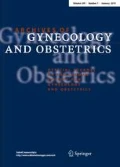Abstract
Purpose
Long-term follow-up 11 years after endometrial ablation.
Methods
A questionnaire on menstruation, hormone treatment, and operations on women, which had 421 endometrial ablations during 1990–1996, was added to registered data on cancer, operational and obstetrical history.
Results
Eighty-two percent of the questionnaires were returned and answered. Of those women on hormone treatment after ablation 26% had a hysterectomy later on compared to 34% of women with no hormone treatment after ablation (P = 0.28; χ 2 test). Hysterectomy was directly proportional to the amount of meno/metrorrhagia; however, the number of women with a hysterectomy was evenly distributed in relation to the duration of hormone treatment. The time of hormone treatment in relation to the ablation was not associated with the distribution of meno/metrorrhagia or whether the women had a hysterectomy later on. We observed three women with incidental endometrial cancer at follow-up and the expected numbers were 6.8 cases.
Conclusion
Endometrial ablation is an effective form of treatment for menorrhagia with no increase in the incidence of endometrial cancer. Hormonal treatment does not seem to have any influence on the course of events.

Similar content being viewed by others
References
http://www.dsog.dk/gynstat/TCRE/ER.htm. Homepage for Danish Society of Obstetrics and Gynaecology
Neuwirth RS, Loffer FD, Trenhaile T et al (2004) The incidence of endometrial cancer after endometrial ablation in a low-risk population. J Am Assoc Gynecol Laparosc 11:492–494. doi:10.1016/S1074-3804(05)60081-3
Krogh RA, Neumann GA, Lauszus FF et al (2007) Hysterectomy is associated to stress incontinence in women, who previously had a transcervical endometrial resection. Gynecol Obstet Invest 63:121–125. doi:10.1159/000096433
Rasmussen KL, Krogh RA, Guttorm E et al (2007) Influence of Body Mass Index on hysterectomy rate after endometrial resection. Acta Obstet Gynecol Scand 86:889–891. doi:10.1080/00016340701315030
Neumann G, Olesen PG, Hansen V et al (2004) The short-term prevalence of de novo urinary symptoms after different modes of hysterectomy. Int Urogynecol J Pelvic Floor Dysfunct 15:14–19. doi:10.1007/s00192-003-1105-9
http://www.sst.dk/Informatik_og_sundhedsdata/Download_sundhedsstatistik/Kraeft/Kraeft_2.aspx. Homepage for the Danish National Board of Health
Heinonen PK, Helin R, Nieminen K (2006) Long-term impact and risk factors for hysterectomy after hysteroscopic surgery for menorrhagia. Gynecol Surg 3:265–269. doi:10.1007/s10397-006-0219-8
Levgur M (2007) Therapeutic options for adenomyosis: a review. Arch Gynecol Obstet 276:1. doi:10.1007/s00404-006-0299-8
Neis KJ, Brandner P (2000) Adenomyosis and endometrial ablation. Gynaecol Endosc 9:141–145. doi:10.1046/j.1365-2508.2000.00335.x
Istre O, Langebrekke A (2003) Repeat hysteroscopic surgery reduces the hysterectomy rate after endometrial and myoma resection. J Am Assoc Gynecol Laparosc 10:247–251. doi:10.1016/S1074-3804(05)60306-4
Gannon MJ, Johnson N, Watters JK et al (1997) Hematometra- endometrial resection-sterilization syndrome. Gynaecol Endosc 6:45–46. doi:10.1046/j.1365-2508.1997.630473.x
Al-Taie RRI, Holmskov A (2008) Two intrauterine pregnancies after transcervical endometrial ablation. Ugeskr Laeger 170:549 To intrauterine graviditeter efter transcervikal endometrie-resektion
McCausland AM, McCausland VM (2007) Long-term complications of endometrial ablation: cause, diagnosis, treatment, and prevention. J Minim Invasive Gynecol 14:399–406. doi:10.1016/j.jmig.2007.04.004
Istre O, Holm-Nielsen P, Bourne T et al (1996) Hormone replacement therapy after transcervical resection of the endometrium. Obstet Gynecol 88:767–770. doi:10.1016/0029-7844(96)00308-0
Valle RF, Baggish MS (1998) Endometrial carcinoma after endometrial ablation: high-risk factors predicting its occurrence. Am J Obstet Gynecol 179:569–572. doi:10.1016/S0002-9378(98)70045-6
Marjoribanks J, Lethaby A, Farquhar C (2006) Surgery versus medical therapy for heavy menstrual bleeding. Cochrane Database Syst Rev (2)
Conflict of interest statement
None.
Author information
Authors and Affiliations
Corresponding author
Additional information
K. Rasmussen died on 26 March 2007.
Appendices
Appendix
Questionnaire for women about dysfunctional uterine bleeding
-
1.
Have you at any period in your life used hormonal treatment?
-
2.
If yes, what was the reason or reasons for it?
-
3.
Did you have any effect of hormonal treatment?
-
4.
In which form did you use hormones?
-
5.
Did you have any bleeding problems during hormonal treatment?
-
6.
Did you take hormones before, after or as well as before and after transcervical endometrial resection?
-
7.
If you do remember the name of hormone(s), please write below.
-
8.
Did you have any bleeding problems after transcervical endometrial resection?
-
9.
Have you had your uterus removed later in life?
-
10.
If yes, what was the reason?
-
11.
If you had your uterus removed, do you remember at which hospital and when the operation was performed?
-
12.
Any concluding remarks on hormonal treatment, transcervical endometrial resection or hysterectomy.
Rights and permissions
About this article
Cite this article
Krogh, R.A., Lauszus, F.F., Guttorm, E. et al. Surgery and cancer after endometrial resection. Long-term follow-up on menstrual bleeding and hormone treatment by questionnaire and registry. Arch Gynecol Obstet 280, 911–916 (2009). https://doi.org/10.1007/s00404-009-0989-0
Received:
Accepted:
Published:
Issue Date:
DOI: https://doi.org/10.1007/s00404-009-0989-0



